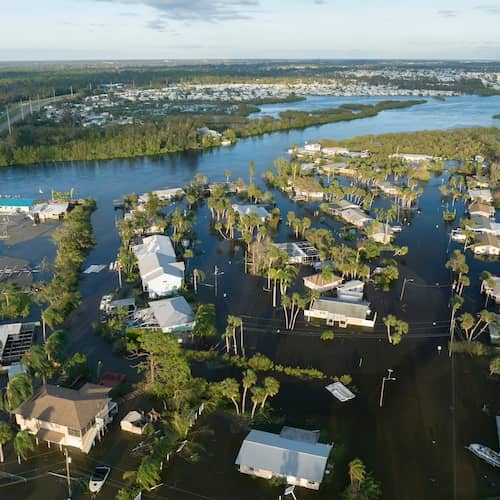What is a homeowners insurance binder and when do you need one?
Contributed by Karen Idelson, Tom McLean
Aug 15, 2025
•6-minute read

When buying a home, you’ll want to protect your new investment using homeowners insurance. Before you buy homeowners insurance and close on your new house, your insurance provider may issue you an insurance binder. But how do you know whether you need an insurance binder, and how does the process work?
Below, we’ll discuss a homeowners insurance binder and how to get one from your insurance company.
What is an insurance binder?
An insurance binder is a temporary contract between you and your insurance provider that proves you’ve purchased homeowners insurance coverage. The binder is a placeholder for a formal insurance policy, showing proof of insurance coverage on a property. A binder can prove insurance coverage, its effective date, and the yearly premium. A binder can provide you with full coverage while you await a more formal issuance.
Your insurance binder contains all the details of your new insurance policy and acts as your proof of insurance for a potential mortgage lender.
An insurance binder is different from an insurance declaration page, which summarizes the coverage provided by your insurance company. When your declaration page becomes available, that’s usually when your binder expires, because you no longer need temporary proof of insurance coverage.
When do you need a homeowners insurance binder?
Homeowners insurance is not legally required but your lender will want you to have it. And you need a homeowners insurance binder as temporary proof of coverage because formal policies can take up to a few weeks to produce. Think of a binder as a short-term link to your future policy.
This binder may become necessary due to delays that come up when you’re closing on your loan. There could be a gap in timing where the insurance policy is still processing through the underwriting stage and hasn’t been issued yet. You can prove your home is covered during this time with an insurance binder issued by your insurance company.
If you don’t yet have an official policy, your home insurance binder will be required for the underwriting process and before you close on a mortgage. Binders often include information about your insurance coverage and policy limits.
How to read an insurance policy binder
Your homeowners insurance binder will include a description of your home, the address of the property you insured, the type of property you insured, the name of your insurance company, and the coverages attached to your policy.
Let’s go over all the information included in your insurance binder contract.
The named insured and loss payee
The “named insured” refers to the policy owner. This could be an individual or a couple. Your binder must show the insurance policy owner(s). The insurance binder may also show any additional insureds, which include co-owners of a property.
A “loss payee” refers to either an individual or business that has first right to any claims filed, ensuring they can protect their financial interest. Your mortgage lender would be an example of a loss payee. They are named on the binder and policy, as this allows them to receive compensation to recoup any mortgage costs related to a filed claim.
Details about the insurance company
Typically, a home insurance binder includes the name of the insurance agency or agent and the name of the insurance company through which you purchased coverage.
You will also find the mailing address and contact information for both the insurance company and your agent (if you used one).
Details on the type of insurance policy
The insurance binder also shows the type of insurance coverage you have on your home. You may want to compare what different insurance companies offer so you can see cost of their insurance policies. Here are a few different coverage options you may include in your home insurance policy:
- Dwelling coverage: This option covers the costs to repair or rebuild your physical home if it’s damaged or destroyed by a covered loss.
- Personal property coverage: This coverage protects your property (your laptop, clothing or any of your personal items) if they are stolen, lost, or destroyed because of a covered loss.
- Other structures coverage: If you have a detached garage, a pet house, or even a shed, your other structures coverage protects these separate buildings.
- Medical liability coverage: Also called medical payments coverage, this insurance covers medical expenses if someone gets hurt while visiting your home.
Perils your policy insures against
The most common type of homeowners insurance is an HO-3 policy. Also known as a Special Form policy, it covers both open perils and named perils. Open perils refer to any damage or loss to your property unless specifically excluded by the property. Named perils are those events precisely defined by your policy.
It’s a good idea to ensure your binder includes as much information as possible about all covered perils, ensuring a smooth and easy closing process.
Coverage limits of your policy
It’s also a good idea to pay attention to the coverage limits of your policy. To close on a mortgage, your binder must show the specific limits on your policy to make sure it fully covers your home.
Your binder should also include information such as the homeowners insurance deductible amount and any special coverages or limits.
Let’s discuss the coverage limits of your homeowners insurance policy in greater detail.
- Policy limits: Each part of your policy has a different policy limit, or the max amount of money an insurer will pay for a claim.
- Special coverages: This is where the insurance company can note any special coverages and items added to the policy.
- Deductibles: Your deductible is the amount of money you’ll pay out of pocket before the insurance company kicks in with their coverage.
How to get a homeowners insurance binder
It’s easy to get a homeowners insurance binder. Once you pay your first month’s premium, your insurance company will issue you a homeowners insurance binder as temporary proof of insurance coverage during the underwriting process.
It is possible to have an approved policy before going to the closing table, which won’t require you to have an insurance binder at all. You can contact your insurance company directly if you need a hard copy of your insurance binder or a copy of your in-force or formal policy.
FAQ
Still have questions? Below, we answer a few additional questions you may have about homeowners insurance binders.
Do home insurance binders expire?
Yes, home insurance binders usually expire within 30 – 90 days of the time they are issued and will not cover your property once they end. Ensure you have either a copy of your actual insurance policy or an insurance declaration page before your binder reaches the expiration date.
What’s the difference between an insurance binder and a certificate of insurance (COI)?
An insurance binder is temporary proof of coverage and evidence of the insurance policy. The provider can issue a binder when proof of insurance is needed.
A certificate of insurance (COI), also called a declarations page, is a summary of your homeowners insurance policy details and proof of insurance. The policy is generally officially issued after the underwriting process is complete, replacing the insurance binder.
Do all insurance companies offer insurance binders?
Not all insurance companies offer insurance binders. But most insurers can now issue official policies quickly, making a temporary binder unnecessary during the process. Some insurance companies may even skip the binder by writing a future effective date of coverage, which mortgage lenders can accept as proof of homeowners insurance coverage for new policyholders.
Can my insurer cancel my homeowners insurance binder?
An insurer may decide to cancel your insurance binder if they determine you do not meet underwriting standards. However, because binders still provide coverage, the insurance company must send you a cancellation notification in advance.
It’s a good idea to check with a local insurance agent, as these terms and conditions can vary by state.
The bottom line: A homeowners insurance binder is important
If there is a delay in the underwriting process when you purchase a home, it’s still important to be sure the house you’re buying is covered for loss or damage during the gap before your regular homeowners insurance begins. A home insurance binder gives you peace of mind against unexpected events and assures your lender that their financial interests are protect. Check with your insurance company about your binder or have an active policy in place when you’re closing on your new home.
Feeling more prepared for the home buying process? Secure your mortgage approval today with Rocket Mortgage®.

Melissa Brock
Melissa Brock is a freelance writer and editor who writes about higher education, trading, investing, personal finance, cryptocurrency, mortgages and insurance. Melissa also writes SEO-driven blog copy for independent educational consultants and runs her website, College Money Tips, to help families navigate the college journey. She spent 12 years in the admission office at her alma mater.
Related resources
6-minute read
Is home insurance tax deductible?
Homeowners can’t deduct homeowners insurance from income taxes, unless it’s a rental property. Learn more about which homeownership expenses are tax...
Read more

9-minute read
Filing a homeowners insurance claim after a natural disaster
If you’re thinking about filing a homeowners insurance claim to repair your house in the wake of a natural disaster, you may wonder, “Does home insu...
Read more
4-minute read
What is hazard insurance for homes: A homeowners guide
Hazard insurance protects your home from natural disasters. Learn what it is, what is covered under hazard insurance and how it’s different from homeowner...
Read more